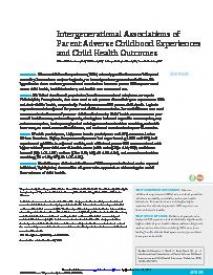Intergenerational Associations of Parent Adverse Childhood Experiences and Child Health Outcomes
BACKGROUND: Adverse childhood experiences (ACEs) robustly predict future morbidity and mortality. Researchers are just beginning to investigate intergenerational effects. We hypothesize there are intergenerational associations between parent ACE exposure and worse child health, health behaviors, and health care access and use.
METHODS: We linked data from 2 population-based cross-sectional telephone surveys in Philadelphia, Pennsylvania, that were used to ask parents about their past exposure to ACEs and their child’s health, respectively. Participants were 350 parent-child dyads. Logistic regression models adjusted for parent and child characteristics. Parent ACE score was used to summarize indicators of parents’ childhood adversity. Child health outcomes were poor overall health status, asthma diagnosis, obesity, low fruit and vegetable consumption, any soda consumption, inadequate physical activity, excessive television watching, no health insurance, no usual source of health care, and no dental examination in past 12 months.
RESULTS: Of adult participants, 80% were female participants and 45% were non-Latino African American. Eighty-five percent of parents had experienced ≥1 ACE and 18% had experienced ≥6 ACEs. In adjusted models, each additional parent ACE was associated with higher odds of poor child overall health status (odds ratio [OR] = 1.19; 95% confidence interval [CI]: 1.07–1.32), asthma (OR = 1.17; 95% CI: 1.05–1.30), and excessive television watching (OR = 1.16; 95% CI: 1.05–1.28).
CONCLUSIONS: The full scope of the health effects of ACEs may not be limited to the exposed individual, highlighting the need for a 2-generation approach to addressing the social determinants of child health.
Geachte bezoeker,
De informatie die u nu opvraagt, kan door psychotraumanet niet aan u worden getoond. Dit kan verschillende redenen hebben,
waarvan (bescherming van het) auteursrecht de meeste voorkomende is. Wanneer het mogelijk is om u door te verwijzen naar de bron
van deze informatie, dan ziet u hier onder een link naar die plek.
Als er geen link staat, kunt u contact opnemen met de bibliotheek,
die u verder op weg kan helpen.
Met vriendelijke groet,
Het psychotraumanet-team.
In: Pediatrics, ISSN 0031-4005 ; eISSN 1098-4275 | 141 | 6 | June | e20174274
https://doi.org/10.1542/peds.2017-4274


